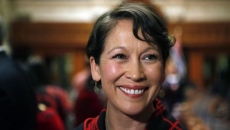British Columbia is reducing the size of gatherings and events over the next six weeks in an effort to contain an expected rapid rise in cases due to the highly transmissible COVID-19 Omicron variant.
Daily new cases of COVID-19 have nearly doubled in the last week. To help keep people safe over the holidays, new provincial health officer orders are in effect as of December 20 until January 31. For more information: https://t.co/8Rz6gITRYu #CovidBC pic.twitter.com/ZyxfoOjFtf
— BC Government News (@BCGovNews) December 17, 2021
Cases are spiking because of the Omicron variant in Nova Scotia, Quebec, Ontario and globally, and B.C. will face the same surge within the next week, provincial health officer Dr. Bonnie Henry said Friday.
Starting Monday, restrictions on events and gatherings will be in effect until the end of January to reduce the spread of the Omicron variant.
"This is, of course, not where we want to be," Henry said at a news conference. "It is the reality of where we are."
Join Adrian Dix, Minister of Health, and Dr. Bonnie Henry, BC's provincial health officer, for an update on COVID-19. https://t.co/uB8J6avFmU
— BC Government News (@BCGovNews) December 17, 2021
The new public health measures range from limits on venues that hold more than 1,000 people to 50 per cent capacity to no youth or adult sports tournaments over the Christmas holiday period and cancellation of all New Year's Eve parties, Henry said.
Indoor family gatherings, including those at rental or holiday properties, are limited to one household, plus 10 guests, and everyone must be vaccinated, she said.
"The newest variant, the Omicron variant of concern, is adding new and more complex challenges to our pandemic," said Henry. "It is moving quickly and so must we. Right now we must slow the spread."
The 50 per cent capacity at venues that hold more than 1,000 people applies to sports events, including hockey games, theatre performances and music concerts and will ensure there is additional space for people, she added.
Public health officials warn the Omicron variant could propel an enormous spike in COVID-19 cases over the next few months. But there's still a lot scientists need to learn about the latest mutation.
Here's what Canadian public health officials know about the variant so far:
Prevalence
— Almost 350 confirmed cases have been reported in 11 provinces and territories. Increasing numbers of cases are not linked to travel, pointing to community transmission in several parts of the country with outbreaks in multiple settings.
— The World Health Organization said Omicron has been reported in 77 countries worldwide but is likely already in most countries, even if not yet detected.
Transmissibility
— Omicron has potential to spread more quickly than Delta, which was already highly transmissible.
— Canada's chief public health officer Dr. Theresa Tam says aerosol transmission is a main route of spread, and said to "think of it like smoke in the room: those closest to the source will inhale more." As a result, masking and ventilation are "very important."
— It's suspected that the incubation period for the Omicron variant may be a little bit shorter than for the other variants, but Tam says that is still under investigation.
Severity
— It's not currently known whether Omicron carries a higher or lower risk of severe illness or death.
— Some of the current COVID-19 treatments may be less effective against Omicron than against other variants.
— Larger numbers of cases could impact health-care capacity. If it's assumed Omicron is three times more transmissible than Delta and becomes the dominant strain, the federal modelling has suggested the number of daily cases in Canada could explode to 26,600 by mid-January from about 3,300 currently.
Immunity
— Being fully vaccinated and then getting a booster shot is expected to reasonably protect against infection and likely offers strong protection against severe illness. However, experts say that must be combined with layers of public health measures and individual precautions.
— Omicron cases have been detected in both vaccinated and unvaccinated people, as well as in previously infected people.






